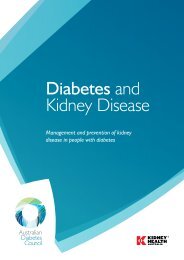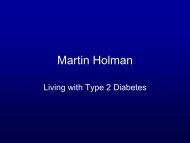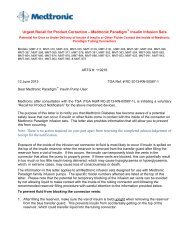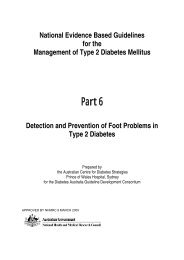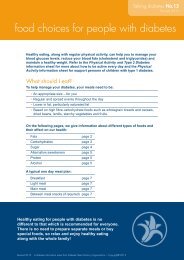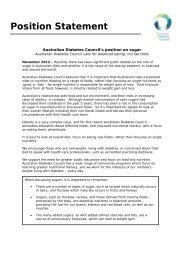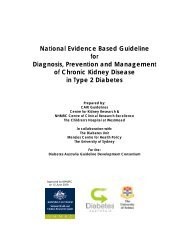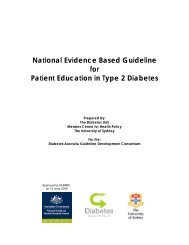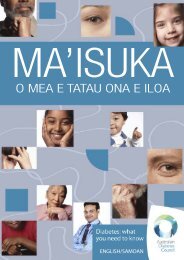Tamil - Australian Diabetes Council
Tamil - Australian Diabetes Council
Tamil - Australian Diabetes Council
- No tags were found...
Create successful ePaper yourself
Turn your PDF publications into a flip-book with our unique Google optimized e-Paper software.
A build up of ketones can lead to a condition called ketoacidosis, requiring urgent medical<br />
attention. Diabetic ketoacidosis (DKA) is a life threatening condition that usually only occurs<br />
in people with type 1 diabetes. It causes dehydration and a buildup of acids in the blood.<br />
This results in vomiting and increased drowsiness.<br />
DKA IS AN EMERGENCY AND REQUIRES URGENT MEDICAL ATTENTION<br />
In very rare cases ketoacidosis can occur in people with type 2 diabetes and is<br />
usually caused by a serious infection.<br />
With type 2 diabetes it is not usually necessary to test for ketones. Discuss with your diabetes<br />
health care team if you need to check for ketones.<br />
There are two methods of testing for ketones – testing urine and<br />
testing blood :<br />
Urine Ketone Test<br />
Urine test strips are available to check for ketones. Ask your<br />
pharmacist about the types of urine ketone strips available and<br />
carefully follow the directions for testing. Urine ketone tests must be<br />
timed exactly using a watch or clock with a secondhand.<br />
Blood Ketone Test meter<br />
There are meters available to test blood for ketones. The same drop<br />
of blood to be tested for glucose can be used to test for ketones. Different test strips are<br />
used for testing glucose and ketones. Ketone test strips are not subsidised by the National<br />
<strong>Diabetes</strong> Services Scheme at present.<br />
Seek URGENT medical attention if:<br />
• The urine ketone test shows medium or high levels of urine ketones.<br />
• The blood ketone test result is higher than 0.6 mmol/L.<br />
Hyperosmolar Hyperglycaemic Syndrome (HHS) - previously known as Hyper<br />
Osmolar Non Ketotic coma (HONK)<br />
HHS is a complication of type 2 diabetes that involves extremely high blood glucose (sugar)<br />
levels without the presence of ketones. This medical emergency occurs in anyone with type<br />
2 diabetes, regardless of treatment.<br />
When blood glucose levels are very high, the body tries to get rid of the excess glucose<br />
(sugar) in the urine. This significantly increases the amount of urine and often leads to<br />
dehydration so severe that it can cause seizures, coma and even death.<br />
The main causes of HHS/ HONK are:<br />
• Undiagnosed type 2 diabetes<br />
• A current illness or infection e.g. pneumonia and urinary tract infection<br />
• Other major illnesses e.g. stroke, heart attack<br />
• Persistent physical or emotional stress<br />
• Certain medication. This is another reason you need to talk to your diabetes health care<br />
team about the medications you are taking.<br />
Signs and Symptoms include:<br />
• Severe dehydration<br />
• Shock<br />
• Changes in consciousness<br />
• Coma.<br />
HHS/HONK requires URGENT medical attention.<br />
70




